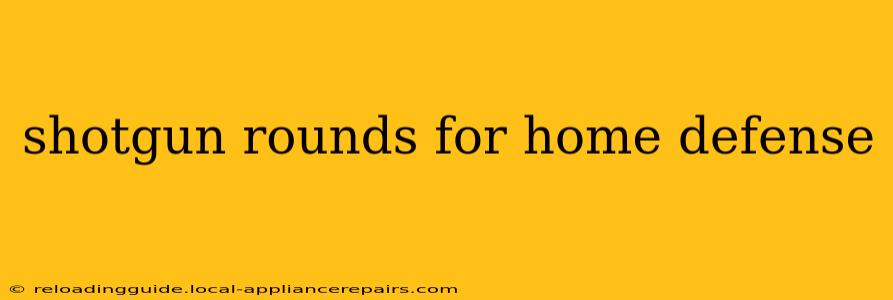Choosing the right ammunition for home defense is a critical decision, and for shotgun users, that choice becomes even more nuanced. The sheer variety of shotgun rounds available can be overwhelming, so understanding the pros and cons of different options is paramount. This guide will help you navigate the complexities and select the best shotgun rounds for your home defense needs.
Understanding the Factors
Before diving into specific ammunition types, let's outline the key factors influencing your decision:
-
Stopping Power: This refers to the round's ability to immediately incapacitate a threat. You need a round that delivers enough energy to stop an attacker quickly and decisively.
-
Penetration: While stopping power is crucial, you also need to consider penetration. Over-penetration poses a significant risk to innocent bystanders or occupants in adjacent rooms or structures. Under-penetration is equally problematic, as it may fail to stop the threat effectively.
-
Pattern Density and Spread: Shotgun patterns aren't always uniform. A tighter pattern means more pellets hitting the target in a smaller area, increasing the likelihood of a quick stop. However, excessive spread can decrease effectiveness at longer ranges.
-
Recoil: Excessive recoil can negatively affect your ability to accurately aim and fire follow-up shots, particularly under stress.
-
Legal Considerations: Laws regarding ammunition vary by location. Always check your local regulations before purchasing any ammunition.
Types of Shotgun Rounds for Home Defense
Here's a breakdown of common shotgun rounds and their suitability for home defense:
1. Buckshot
Buckshot is a popular choice for home defense due to its effective stopping power. It typically consists of multiple large lead or other metal pellets.
- Advantages: High stopping power, relatively good penetration for its size (though still less than slugs).
- Disadvantages: Can over-penetrate, especially with heavier gauges and at longer ranges; wider pattern dispersion compared to slugs. The number of pellets and size varies widely (e.g., 00 buck, #1 buck, etc.), affecting both penetration and pattern density.
2. Birdshot
Birdshot, designed for hunting birds, is generally not recommended for home defense. Its small pellets lack the stopping power needed to neutralize a threat quickly, and it's likely to under-penetrate.
3. Slugs
Shotgun slugs are single projectiles, similar to rifle bullets.
- Advantages: Excellent penetration and stopping power, suitable for longer ranges. Offer a tighter grouping than buckshot.
- Disadvantages: Increased risk of over-penetration, significant recoil, less effective at close range due to potential for a single pellet miss.
4. Reduced-Recoil Ammunition
Many manufacturers offer reduced-recoil ammunition specifically designed for home defense. These rounds often use lighter shot or specialized loading techniques to decrease recoil.
- Advantages: Improved shooter control, especially for those with less experience or strength.
- Disadvantages: May sacrifice some stopping power or penetration compared to full-power rounds.
Choosing the Right Gauge
Gauge refers to the diameter of the shotgun barrel. Smaller numbers indicate larger diameters (e.g., 12 gauge is larger than 20 gauge).
- 12 Gauge: Widely popular for home defense, offering significant stopping power. However, it also produces substantial recoil.
- 20 Gauge: Lighter recoil, making it a good option for smaller or less experienced users. Still offers decent stopping power, although less than a 12 gauge.
Beyond the Ammunition: Practice and Training
The best ammunition is useless without proper training. Regular practice with your chosen shotgun and ammunition is crucial to becoming proficient and ensuring you can effectively handle the weapon under pressure. Consider professional training to develop appropriate home-defense tactics.
Disclaimer: This information is for educational purposes only and does not constitute professional advice. Always consult with qualified firearms instructors and legal professionals to ensure compliance with all applicable laws and regulations. The safe handling and use of firearms require training and practice. Improper handling of firearms can result in serious injury or death.

